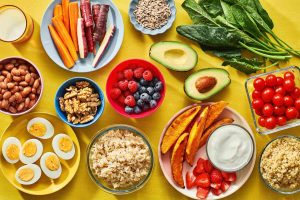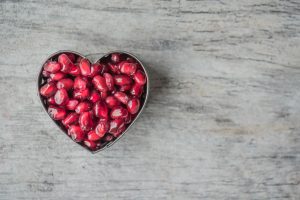We all know how important it is to eat a healthy diet, and yet it can be so easy to do the exact opposite! You promised yourself you wouldn’t have any more sweets this week, but that donut looks so enticing…you didn’t have time to have lunch and so you end up grabbing something from a convenience store that you know is high in salt and sugar. We all find ourselves in these situations, and it can be demoralizing when we have the best intentions and they go astray.
More and more research is coming out about the impact our diet has on our mental health. In one case, a 12 week study was done on a group of males with severe depression who were placed on a mediterranean diet, which emphasizes plenty of fresh fruits and vegetables, whole grains, beans, nuts, moderate meat and seafood, and healthy fats like olive oil. At the end of the 12 weeks the participants showed a dramatic reduction in their depressive symptoms, which speaks to the incredible power of whole and nutritious foods.
While that’s just the results of one study, there are countless others that show that a healthy diet can help individuals feel more focused, alert and energetic, while also easing symptoms of anxiety, depression, and other mental health disorders.
However, despite knowing all of this, it can still be hard to make healthy choices, so today, we’re going to lay out some nutrition hacks that can help making healthy choices on a daily basis just a little bit easier.
Eat Breakfast (with protein!)
While the debate on whether or not breakfast is the most important meal of the day is ongoing, what is clear is that it can have major benefits on your mood and other eating habits for the rest of the day.
Some people find they’re not hungry first thing in the morning, so there might be a little bit of an adjustment period while your body gets used to eating if you didn’t eat breakfast previously. If you’re someone who’s not used to eating first thing, or you’re always in a rush, then it might be a good idea to prepare something the night before or pick something simple, like overnight oats, an apple with peanut butter, or a boiled egg and toast.
Whatever you eat, it will have the most beneficial impact if you choose something with protein, carbs, and ideally some fiber to help you feel full and satisfied for longer into the afternoon. Eggs, oats, protein smoothies and toast with fruit and nut butter are all great options.
Try not to go for a donut or other baked goods like a bagel, at least not on their own. While it might taste good, baked goods are high in carbs, which are important for that immediate feeling of fullness, but won’t carry you through until lunch, and they can also spike your blood sugar, which could lead to a crash once those levels come down, leaving you feeling sleepy and lethargic.
WebMD points to the fact that eating breakfast can also help curb snacking on unhealthy food throughout the day, which can improve your mental health and your physical health at the same time!
Stay Hydrated
While water might not be the first thing that comes to mind when thinking about nutrition, it is a key piece of the puzzle that is good health. Water is essential for keeping our bodily functions running smoothly. It assists in eliminating waste from our bodies, protects our organs, and helps us absorb nutrients.
There’s conflicting information about exactly how much water we need each day, but the Mayo Clinic states that the average amount of water that Americans living in temperate climates with a moderate level activity should consume is around 3.7 liters for males, and 2.7 for females. Of course, if you’re in an extremely warm climate or participating in a lot of physical activity then you may require more hydration than the average person.
A good rule of thumb is to always drink when you’re thirsty, and make sure that you are mindful of drinking enough water when out in the heat, if you’re sick, or if you’re exerting yourself more than usual. Mild dehydration can lead to you feeling sluggish, tired and grumpy, while severe dehydration can have fatal consequences.
Thankfully, most people don’t need to worry about severe dehydration, but that doesn’t mean you should forget about water! Staying well hydrated is one of the easiest ways to give your nutrition a boost, so it’s a great hack. And you don’t need to just drink water to get your hydration, you can enjoy various herbal teas and sugarless sodas, or get some of your intake from foods that are high in water, such as watermelon, cucumber, celery, lettuce and strawberries. Maybe instead of a glass of water you finish your day with a hydrating fruit salad!
Meal Prep
Sometimes the hardest part of eating healthy is the effort and planning required. Why cook when you can just order a pizza? That’s why prepping food in advance can be so helpful, because if the food is already in the fridge and ready to go then it’ll be a lot easier to reach for.
Everyone is different, so there are a few ways you can go about meal prepping. It might be a good idea to try out a few methods to find out what works best for you.
One version of meal prepping is to plan all your meals and snacks in advance and have everything stored in your fridge or freezer for you to access throughout the week. Generally you’ll spend one day prepping everything, but then won’t have to do anything but heat meals up when you want to eat them. This is great for those who like routine and predictability, but can frustrate those who get bored easily as they might not like knowing exactly what they’re going to eat each day, or eating the same thing too many days in a row.
Another way to approach meal prepping is by prepping some bases and sauces, but not having a set menu or fully prepared meals. This might look like pre-cooking batches of healthy carbs like quinoa, brown rice and sweet potato, and then having containers of chopped vegetables and maybe some hard boiled eggs and a rotisserie chicken. You might then prepare a few different sauces and dips that can allow you to make a variety of bowls and salads. This can give you enough variety that you don’t feel like you’re eating the same thing every night, but take away some of the stress of having to come up with a meal from scratch.
Sometimes even having a few simple snacks prepped in the fridge can go a long way, such as a platter of chopped vegetables and a high-protein dip made from beans or cottage cheese. Anything that will make eating healthier easier for you is going to help you meet your nutrition goals.
Meal Delivery
For those who don’t like meal prepping, but are wanting to stay away from the extra sugar and salt of take out, a meal delivery service can be a great option. Many cities offer specialized meal plans that can account for a variety of dietary preferences and medical needs, meaning you can get fresh and delicious meals delivered for you that you simply need to heat up and you’re set.
For an option in between the two, there are also services that deliver all the ingredients of a meal with a simple recipe attached. Everything is portioned so that you don’t waste any food, and most meals are ready within 30 minutes. This is a great way to learn to cook while taking away the stress of meal planning or shopping, and is also great for portion control.
Make Things Easier
For some reason, this idea has gotten around that frozen or canned food is bad for you, or that it loses all of its nutrients in the process. While there can be some nutrient loss in canned food, and some valid concerns about added sugar and sodium, it is still a perfectly healthy choice to use canned food, provided you opt for choices that are not packed in syrup or a high sodium sauce. And when it comes to frozen food, an article published in the BBC cited research that certain vegetables, such as spinach, actually retained more of its vitamin C content than if it had been stored in the fridge!
All that to say, don’t let worries about slight nutritional loss stop you from using food that is convenient. While fresh fruit and vegetables from the garden might have the absolute highest density of nutrients, you’re still going to get a positive benefit from choosing frozen peas over a fast food burger. We all have nights that we’re tired or overwhelmed, and in those moments it can be a great help to be able to reach for a canned lentil soup or a frozen vegetable mix to eat with your pasta.
Eating and cooking healthy can be hard, and that is doubly true for individuals who are struggling with their mental health. Sometimes even the act of eating can be a challenge, so there is absolutely nothing wrong with going for what’s convenient and easy. And if you aim to stock your fridge and pantry with easy menu items that also happen to be nutritious and taste good, then that’s going to be the best thing for your mental health.
Listen to Your Cravings
This might go against all the nutrition advice you’ve previously heard, but eating healthy doesn’t mean you never get to eat the foods you love. In fact, in recent years the idea of eating intuitively and adding food instead of taking it away has begun to take over conversations around diet and healthy eating. The idea, as mentioned in EatingWell, is that a food craving is a signal that our body might be missing something, such as iron or a specific nutrient. So we should learn to listen to our bodies and respond when we hear those signals.
Of course, if you’re spent a lifetime cycling through diets or restricting foods, this concept might be quite difficult and even scary to grasp, but the idea is that we should trust our bodies enough to know that while we might want a milkshake once, or even two days in a row, that doesn’t mean we’ll want one every day for the rest of our lives. Very often if we refuse our bodies the thing it desires then we’ll keep on trying to satisfy it another way until we finally give into the craving. So if you crave a milkshake you might have a banana, then some yogurt, then some dates, then some dark chocolate, then some toast with peanut butter until finally you get the milkshake and you’ve consumed far more calories than you would have had you just had the milkshake to begin with.
Another idea that has been gaining traction on social media is the idea of “add, don’t restrict.” This supports the idea of following your craving, say for some chips, but then checking in with yourself about your needs at the moment. If you are not particularly hungry and are just craving a delicious salty snack, then a small bowl of chips to fulfill that craving should be sufficient. If you’re craving chips but you’re also quite hungry, then you can have the chips, but you’ll want to think about what you can add to the chips that will turn it into a proper, satiating meal. This might mean adding some cheese or a high protein dip and a few vegetables, or some nuts and some slices of fruit. In this way you can satisfy your craving but also meet your nutritional needs. This way you can feel happy and well nourished.
People tend to cycle through a variety of different diets because most of them are too restrictive and they eventually become too difficult to maintain. This is hard on your body and can create feelings of shame and guilt, which is detrimental to your mental health. What if, instead, you could just eat a diet rich with whole foods and healthy options, while still making sure you get to eat some of the old treats you know and love?
Of course, when making any dietary changes, it’s always a good idea to consult first with your doctor. While aiming to eat healthy is always a good idea, what that means exactly is going to differ from person to person. This is especially true for people with diabetes, or health conditions like high blood pressure or cholesterol. In those cases, certain food items that may generally be considered healthy, like fruit or olive oil, might not be safe in large quantities. For anyone who is struggling to make healthy choices, it might also be a good idea to connect with a nutritionist or registered dietician to help get advice on how to meal plan for optimal health.









